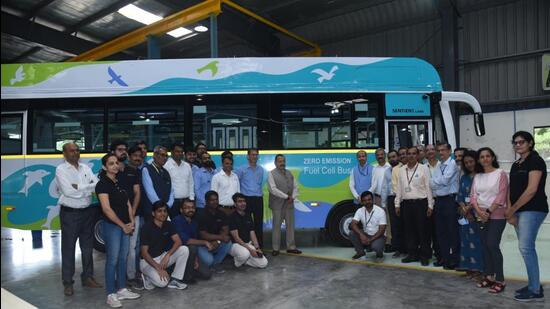Union minister Jitendra Singh unveils indigenously developed hydrogen fuel cell bus in Pune
The hydrogen fuel cell technology has been developed by KPIT in collaboration with the Council of Scientific and Industrial Research – National Chemical Laboratory (CSIR-NCL) and Central Electrochemical Research Institute (CSIR-CECRI)
Union minister of state for science and technology Dr Jitendra Singh on Sunday officially unveiled India’s first indigenously developed hydrogen fuel cell bus in Pune. The hydrogen fuel cell technology has been developed by KPIT in collaboration with the Council of Scientific and Industrial Research – National Chemical Laboratory (CSIR-NCL) and Central Electrochemical Research Institute (CSIR-CECRI).

Singh said,”Green hydrogen is an excellent clean energy vector that enables deep decarbonisation of difficult-to-abate emissions from the refining, fertiliser, steel, cement industries and also from the heavy commercial transportation sector.”
The fuel cell utilises hydrogen and air to generate electricity to power the bus and the only effluent from the bus is water, therefore making it possibly the most environmentally friendly mode of transportation.
“The high efficiency of fuel cell vehicles and the high energy density of hydrogen ensures that the operational costs in rupees per kilometre for fuel cell trucks and buses are lower than diesel-powered vehicles and this can bring freight revolution in India. Moreover, fuel cell vehicles also give zero greenhouse gas emissions,” said Singh.
Dr Singh pointed out that about 12-14% of carbon dioxide emissions and particulate emissions come from diesel-powered heavy commercial vehicles and these are decentralised emissions and hence difficult to capture. He said, “Hydrogen fuelled vehicles provide an excellent means to eliminate the on-road emissions from this sector.”
At CSIR-NCL, Singh inaugurated the Bisphenol-A pilot plant where he said these pilot plants have successfully demonstrated novel process technologies developed by NCL under CSIR’s Covid-19 mission program and Bulk Chemicals mission program.
Bisphenol-A (BPA) is a feedstock for the production of epoxy resins, polycarbonate and other engineering plastics. He said, “The global market for Bisphenol-A is projected to reach 7.1 million tonnes by 2027, growing at a CAGR of 2% over the analysis period 2020-2027. The entire estimated annual demand of 1, 35,000 tonnes in India is imported today. The Minister hoped that CSIR-NCL’s technology will enable import substitution of this important raw material and help in India’s Atmanirbhar Bharat initiative.”





